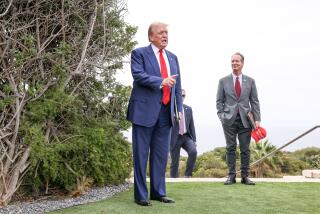Behind the TV Scenes, Campbell Presses His Case
- Share via
PHILADELPHIA — There are two conventions being held in Philadelphia this week. One is the real convention--the montage of speakers, smiles, singers, pennants and pundits framed in that rectangular box Americans are watching at home.
That’s the real convention, because the TV image, more than anything else, shapes the voters’ views of the parties and presidential candidates. As California GOP Chairman John McGraw, a Silicon Valley entrepreneur, says of the convention’s purpose: “It’s a national TV commercial for the Republican Party.”
Then there’s the convention being attended by 30,000 or so pols. In past generations, this was the real convention. Now these pols are the studio props. And, with nothing to fight about, they party a lot.
Californians uncustomarily find themselves slogging through a sauna, sweating profusely and trying to dodge annoying thundershowers--or “boomers,” as they’re called on local TV.
Through it all--the posturing, partying and perspiring--some Californians are pressing their own agendas. For them, the Republican National Convention offers a priceless opportunity.
Like for Rep. Tom Campbell of San Jose, the Republican U.S. Senate nominee. Probably no one here--with the possible exception of Campbell himself--thinks he has any real chance of beating Democratic Sen. Dianne Feinstein. So his goal is to persuade party activists and money donors they’re all wrong; he really does have a prayer, with their help.
Sure, he concedes, “I have an uphill climb.”
*
*
This is how he’s clambering:
Campbell planted his own campaign poll with California reporters Sunday showing that he’s trailing Feinstein by “only” 11 points, rather than the 26 found recently by the nonpartisan Field Poll. Then the congressman disingenuously--but typically for a candidate--announced to the California delegation that “newspapers now are reporting” he’s gaining on the Democrat.
Also, to show campaign viability, Campbell called a news conference to announce he’s running TV ads in California. Never mind that he could afford only a $250,000 time buy--about a quarter of what normally is considered minimal.
Campbell, 47, badly needs to raise his name ID, and attract young people and independents who ordinarily wouldn’t vote. Without expanding the electorate, even the candidate admits he’ll lose. So the Stanford law professor is projecting himself, not inaccurately, as a party maverick--his campaign buzz word.
In Philadelphia, Campbell has been wrapping himself around maverick Sen. John McCain, pushing abortion rights while equating pro-choice activism with the civil rights movement, and declaring that the war on drugs has been lost, so stop fighting Colombian cartels and start treating more American addicts.
He even favors experiments to wean addicts off narcotics by providing them with gradually smaller free fixes. Works in Zurich, Switzerland, he says. And, no, he’s never done drugs, he replies. Not even smoked pot.
Some pols theorize that even if Campbell loses to Feinstein but runs well, he could be in position to challenge popular Democratic Gov. Gray Davis in 2002.
*
*
Right now, there’s no competitive challenger in sight.
State Senate Republican Leader Jim Brulte, 44, of Rancho Cucamonga? “I’m not going to run statewide in 2002,” Brulte firmly told me Tuesday night, standing on the chaotic convention floor with the other props.
L.A. Mayor Richard Riordan? “I can’t imagine that I’ll run,” he said. “I’m not sure anybody can beat Gray Davis.”
The most likely gubernatorial candidate--
sacrificial lamb?--is Secretary of State Bill Jones, the lone surviving GOP statewide officeholder. Here, he’s healing wounds self-inflicted by his defection to McCain last winter after having first endorsed George W. Bush.
“There’s still some people upset and understandably so,” Jones said, sipping a Coke. But he’d do it again, Jones added, because Bush then was implying that independents weren’t welcome in GOP primaries.
Jones says he’ll wait to see whether Bush carries California. If Bush does, he says, that will prove that a Republican still can win in the state and “I’ll seriously consider the governor’s race.” If Bush doesn’t, forget it. A Bush California victory is needed to credibly ask contributors for campaign money, he explains.
Behind the scenes--behind the TV screen--the little-noticed convention is about energizing the Republican faithful for Bush, say Jones and other delegates.
That, and hitting up special interests for political money and partying all hours.
Hardly any delegate is watching the real convention on TV.
More to Read
Get the L.A. Times Politics newsletter
Deeply reported insights into legislation, politics and policy from Sacramento, Washington and beyond. In your inbox twice per week.
You may occasionally receive promotional content from the Los Angeles Times.











